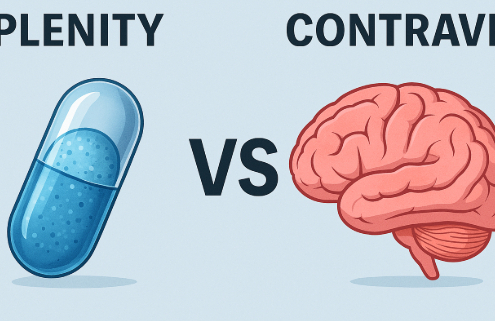Plenity: A Game Changer for Weight Management
Plenity is changing weight management for overweight and obese adults with a scientifically proven, non-systemic approach to weight loss. As a medical device approved by the FDA, Plenity uses a novel nonsystemic oral hydrogel to help patients lose weight safely and effectively.
With obesity rates soaring—41.9% of U.S. adults from 2017 to 2020—solutions like Plenity are essential for addressing coronary artery disease, diabetes and other obesity-related comorbidities.
This SANEMD page answers key questions about Plenity:
- Does it work for weight loss?
- Is it being discontinued?
- Is it prescription-only?
- How much weight can you lose?
What is Plenity (oral superabsorbent hydrogel) and How Does It Work?
Plenity is an oral superabsorbent hydrogel classified as a medical device, not a drug. It’s three capsules taken before meals, with naturally derived building blocks—cellulose and citric acid—that form a three-dimensional matrix. Plenity is taken as a capsule before meals with water to promote weight loss.
Once ingested, these gel particles absorb water in the stomach and small intestine, expanding up to 100 times their original size. This process promotes feelings of fullness, aiding in weight management.
This creates a feeling of fullness, promoting reduced caloric intake and weight management.
The superabsorbent hydrogel takes up space in the stomach and small intestine, mixing with ingested foods to enhance satiety.
Unlike systemic medications, Plenity is nonsystemic, meaning it doesn’t enter the bloodstream or affect medication absorption. It is considered a medical device rather than a medication because it operates through mechanical modes of action.
The gel particles are partially broken down in the digestive tract, and the remaining cellulosic material is excreted naturally, minimizing adverse events like abdominal pain or abdominal distention. The side effects of Plenity primarily include gastrointestinal symptoms such as diarrhea and abdominal pain.
SANEMD Insights: Take Plenity exactly as prescribed—three capsules with 16 ounces of water 20-30 minutes before lunch and dinner—to maximize its absorption capacity and effectiveness.
Does Plenity Really Work for Weight Loss?
Yes, Plenity is proven to work for weight loss. In a double-blind, placebo-controlled study (GLOW trial, Greenway FL, Aronne LJ, Raben), patients self-administered Plenity along with diet and exercise. Results showed more patients in the treatment and placebo groups achieved clinically meaningful weight loss (≥5% of body weight).
Specifically:
- 59% of Plenity users lost at least 5% of their body weight after 24 weeks, compared to 42% in the placebo group.
- Average weight loss was 6.4% (about 14 pounds for a 220-pound person) versus 4.4% for the placebo group.
- Those continuing Plenity for 48 weeks saw a mean weight loss of 7.6%.
The three-dimensional structure of Plenity’s superabsorbent hydrogel uses mechanical modes to reduce hunger, making it easier to stick to a calorie-controlled diet and exercise plan.
While results vary, Plenity outperforms placebo, especially for obese adults with a body mass index (BMI) of 25-40 kg/m².
SANEMD Insights: Reportedly, Plenity work best for patients who combine it with structured lifestyle changes. Its nonsystemic oral hydrogel design minimizes adverse events, making it a safer option for those wary of systemic weight loss drugs.
Is Plenity Being Discontinued?
There is no evidence that Plenity is being discontinued. As of June 2025, Plenity is still available through prescription. Posts from 2019 mention Plenity’s approval, and recent web sources confirm its use in weight management. Rumors of discontinuation might be due to supply chain issues or market competition, but Plenity is still an option for obese adults.
SANEMD Insights: Check with your healthcare provider or pharmacy to verify Plenity’s availability, as regional supply can vary. Always source from licensed providers to avoid counterfeit products.
Is Plenity Prescription Only?
Yes, Plenity is prescription only. The FDA approved it in 2019 for overweight and obese adults with a BMI of 25-40 kg/m², including those with comorbidities like type 2 diabetes or coronary artery disease. A doctor must evaluate your BMI, medical history and weight management goals to prescribe Plenity. This is to ensure it’s safe, especially for patients with conditions like Crohn’s disease, where gel particles could exacerbate symptoms. The FDA approved Plenity in April 2019 as a treatment for overweight and obesity.
Note: Getting Plenity without a prescription is illegal and risky. Always consult a licensed doctor to make sure Plenity is right for you.
How Much Weight Can You Lose on Plenity?
Plenity delivers moderate but consistent weight loss when combined with diet and exercise. Patients using Plenity are advised to maintain a reduced-calorie diet for optimal effectiveness. To better understand how Plenity works, consider that clinical trials show:
- Average weight loss of 6-7.6% of body weight over 6-12 months.
- Some patients lose up to 12% weight loss, results vary.
- For a 220-pound person, this means 12-15 pounds lost on average, with some losing 24 pounds or more.
Plenity’s primary intended use is to aid weight management, not to deliver dramatic weight loss like bariatric surgery. Its superabsorbent hydrogel helps with sustainable weight reduction by reducing hunger, perfect for obese adults who want gradual progress.
SANEMD Insights Track your weight weekly and adjust your diet and exercise to maximize Plenity’s effects. A food journal can help you identify patterns that boost weight loss.These are mild and temporary and will resolve as the body adjusts to the gel particles.
The capsule form contains inactive ingredients like sodium stearyl fumarate and titanium oxide which are safe for most patients. However, Plenity is contraindicated in Crohn’s disease, severe gastrointestinal disorders or pregnancy due to its absorption capacity. Plenity should be used with caution in patients with gastroesophageal reflux disease or heartburn.
SANEMD Insights: Reportedly, staying hydrated (at least 64 ounces daily) reduces infrequent bowel movements and abdominal distention, making patients more comfortable on Plenity.
Plenity Pros and Cons
Pros:
- Non-systemic, minimizes medication absorption risks.
- FDA-approved medical device with robust clinical trials (Greenway FL, Aronne LJ, Raben).
- Supports clinically meaningful weight loss in overweight and obese adults.
- Mild adverse events compared to systemic drugs.
Cons:
- Moderate weight loss (6-7.6%) may not meet expectations for quick results.
Opportunity: Combine Plenity with a nutritionist-led diet and exercise plan for better outcomes.
- Prescription-only access requires a doctor’s visit.
Opportunity: Use the consultation to address comorbidities like coronary artery disease for holistic weight management.
Conclusion: Is Plenity for You?
Plenity is reported to be a game-changer for weight management, a safe nonsystemic oral hydrogel to help overweight and obese adults lose weight.
With clinical trials showing 6-7.6% body weight loss, Plenity is perfect for those with a body mass index of 25-40 kg/m² looking for sustainable results.
It’s not being discontinued, is prescription only and delivers moderate but meaningful weight loss when combined with diet and exercise.
It is overall shown that Plenity for patients willing to commit to lifestyle changes, leveraging its superabsorbent hydrogel to reduce hunger and build healthy habits.
Talk to your doctor to see if Plenity is right for your weight management plan. Read our article on weight loss medications for more on obesity solutions.










